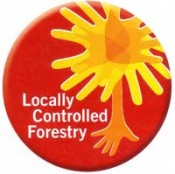Saving Forests by Putting People First
Carbon finance can help reverse both deforestation and climate change, and is a central focus of the UN’s International Year of Forests. Schemes that reduce greenhouse gas emissions from deforestation and forest degradation (REDD) will only work, however, if forest people understand the mechanisms. These new publications aim to help them do just that.

4 January 2011 | The United Nations has declared 2011 the International Year of Forests in an effort to “raise awareness on sustainable management, conservation and sustainable development of all types of forests”. The International Institute for Environment and Development (IIED) has kicked the year off with four briefing papers as part of its Growing Forest Partnerships project, which is being funded by the World Bank in cooperation with the International Union for the Conservation of Nature (IUCN) and the Food and Agricultural Organization (FAO).
Investing in Locally Controlled Forestry
Investing in locally controlled forestry could pave the road to sustainable forest management that reduces deforestation to mitigate climate change while also improving local livelihoods. The idea was born out of a common agenda emerging from dialogue between three key groups of forest right-holders — family forest farmers, forest communities and indigenous peoples. It is backed by solid evidence that local management and political control over forests is good for both forests and people. But making it a reality requires action. In particular, there is a need to build a new agile, international, independently monitored non-sovereign fund, controlled by forest right-holders, that is channelled towards: securing local commercial forest rights; strengthening local forest organisations; and building local entrepreneurial capacity for culturally, environmentally, socially and economically sustainable businesses.
Contact the author – [email protected]
Sustainable Forestry: Connecting Local to Global and Vice Versa
Climate investors are increasingly turning to forests as a means of mitigating and adapting to climate change. But their efforts will only be effective if they respond to local people’s needs and support these people to improve their livelihoods through sustainable forest management. An estimated 30 per cent of the world’s forests are managed by local people, either formally or informally. And it is these people — smallholders, communities and indigenous people — that make forest investments work on the ground. The recent boost to forest funding must enhance their ability to influence policymaking. This requires better communication between global decision makers and local forest managers — both by getting local voices heard in global decision making arenas and by sharing lessons learnt at a global level with local forest managers. Initiatives — such as Growing Forest Partnerships — that support networks of locally controlled forestry groups are making progress on both fronts.
Contact the author – [email protected]
Empowering Communities Through Forest Partnerships
Forests support the livelihoods of millions of local people, are home to invaluable biodiversity, and are critical to mitigating and adapting to climate change. But across the world, they are increasingly threatened by a lack of appropriate forest policies and accessible funds for sustainable forest management and conservation. Partnerships among the historically ‘voiceless’ — local communities, indigenous people, smallholders and other often marginalised groups — are proving to be a powerful tool for stimulating appropriate policy and financing solutions for those people using and managing forests every day.
Contact the author – [email protected]
Making Local Voices Heard: the Three Rights Holders Group (3G)
Harnessing forests’ potential to help meet both environment and development goals demands sustainable forest management that is controlled by local people. Achieving this in practice means policymakers must both fully acknowledge the role, and rights, of local people in managing forests and fully engage these people in forest decision-making processes. It also requires accessible forest funds that more accurately reflect local people’s needs. In response to these needs, a new network — the Three Rights Holders Group, the G3 — has been formed. The network brings together three key alliances of local forest-dependent people, representing family foresters, community forestry organisations and indigenous peoples. Through the G3, these alliances are pushing the locally controlled forestry agenda forward and are making the voices of forest-dependent people heard in both local and global policy arenas.
Contact the author – [email protected]
Additional resources
Please see our Reprint Guidelines for details on republishing our articles.

